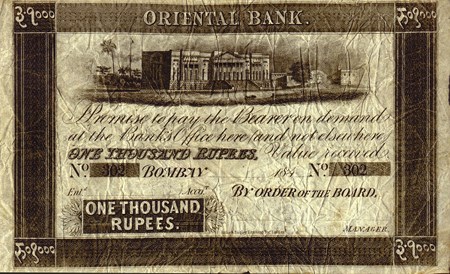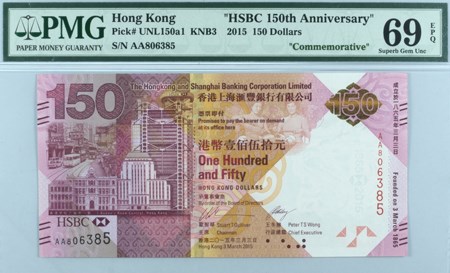The Oriental Bank Corporation: An Ill-Fated Spearhead Of International Banking
Posted on 1/19/2016
The East India Company’s (EIC) longstanding domination of overseas trade began with the dawn of the 17th century and carried into the late 1800s. By the 19th century the EIC was furnishing the tea trade with illegal opium exports to the East. With this practice unpopular at home in London and abroad, the EIC and its monopoly on foreign trade faced strong opposition from the newly established Bank of Western India, which would eventually form the Oriental Bank Corporation and carve a path for other British banks so successful that they continue to thrive today.
The Bank of Western India opened in Bombay, India in 1842. Its purpose was primarily foreign exchange—a function that the EIC, possessing a royal charter (a document from a monarch granting their discretionary powers to a business entity), could not lawfully partake in. In 1845, the bank took the name of the Oriental Bank and set up branches across China, South Africa, Mauritius, Ceylon (now Sri Lanka) and Hong Kong, China. That same year, the bank became the first note-issuing bank in Hong Kong, China.
The Oriental Bank changed its strategy by 1850 and began lobbying the British government for a royal charter. Although this would put it at direct odds with the EIC’s footholds in the East, the Oriental Bank looked to benefit from the investor confidence that a chartered bank inspired and the ability to take legal action as a corporation.
The EIC pushed back and convinced the government to issue a charter that did not allow banking business in India, but only deposition and payment. As a result, the Oriental Bank changed its name to the Oriental Bank Corporation (OBC) in 1851 and focused on silver holdings, as well as providing loans to coffee plantation owners in Ceylon and sugar cane growers in Mauritius. India Pick# S193, above, is one of five listed note types the Oriental Bank issued in India before the charter’s terms were enacted and the bank changed its name.
The OBC continued to provide a dangerous amount of loans to local growers in spite of the explicit rules against doing so in their royal charter. The depreciation of silver and the bank’s low ratio between issued bills of exchange and loans forced them to further their stake in the East to a point of dependency that was ultimately let down.
As silver’s depreciation worsened, so did the yields in Ceylon and Mauritius. Ceylon’s coffee plantations fell victim to Hemileia vastatrix, the fungus that causes coffee leaf rust disease. Mauritius sugar fell off due to insect infestation in the mid-1860s and many plantations were devastated by a cyclone in 1868. As a result, the plantation owners could not make good on their debts. The OBC limped through more poor silver prices in the following decades until shutting down in 1892.
Before the OBC collapsed, British competitors had already begun taking its place overseas. The Hong Kong and Shanghai Banking Corporation and the Chartered Bank of India, Australia and China quickly learned from the OBC’s mistakes and enjoyed doing business amidst an economic resurgence in the 1890s. Their success has continued through the next century (the latter became the Standard Chartered Bank in 1969) and both are still issuing notes today—such as the HSBC’s newest commemorative 150th anniversary note, above.
The banks’ stability following the same economic turmoil that had sunk their competitor illustrates an adaptability that had risen in haste from the first attempts of the British to open banking operations overseas. The HSBC and Standard Chartered Bank are now two of the top 30 companies on the London Stock Exchange and hallmarks among Hong Kong(China)’s stellar cast of note-issuing banks.
Sources:
- Bonin, Hubert and Nuno, Valério. (2016). Colonial and Imperial Banking History. Google Books.
- Ji, Zhaojin. (2003). A History of Modern Shanghai Banking: The Rise and Decline of China's Finance Capitalism. Armonk, NY: M.E. Sharpe.
- Nishimura, Shizuya, Toshioo, Suzuki, and Ranald, Michie. (2012). The Origins of International Banking in AsiaL The Nineteenth and Twentieth Centuries. Oxford: Oxford UP.
- http://www.brittanica.com
- http://www.collectorsclubchicago.org
- http://www.hkma.gov.hk
- http://www.numismondo.net
- http://www.oocities.org
- https://sahelland.wordpress.com/
- http://www.scripophily.net
PMG is an independent member of the Certified Collectibles Group (CCG).
Stay Informed
Want news like this delivered to your inbox once a month? Subscribe to the free PMG eNewsletter today!

